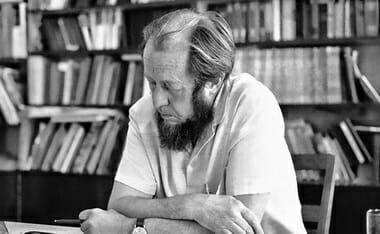“I would like to call upon America to be more careful with its trust and prevent those wise persons who are attempting to establish even finer degrees of justice and even finer legal shades of equality – some because of their distorted outlook, others because of short-sightedness and still others out of self-interest – from falsely using the struggle for peace and for social justice to lead you down a false road. Because they are trying to weaken you; they are trying to disarm your strong and magnificent country in the face of this fearful threat – one which has never been seen before in the history of the world.” ~ Alexander Solzhenitsyn
…found in Larry Elder’s book, Showdown: Confronting Bias, Lies and the Special Interests That Divide America (New York, NY: St. Martin’s Griffin, 2003), 64.
(Book 1)
BigGovernment has this article (GONE! Now found at found at Virtue Online) to which I will only post a small portion of here. It is nice to see this level of deep thought over there!
The fact that moral relativism, multiculturalism, and political correctness are failures hasn’t prevented us from adopting these self-destructive concepts as the basis upon which we interact with others, at home and abroad. The failure to prevent the jihad treason murders at Fort Hood is perhaps the most obscene and obvious culmination of the damage that moral relativism has done to us all.
The Stanford Encyclopedia of Philosophy defines moral relativism as something that one accuses another of, rather than something to which one proudly admits. Reasonable people know that some cultures, ideologies, and political systems are better than others, but most now lack the courage and clarity to declare it.
Most often it is associated with an empirical thesis that there are deep and widespread moral disagreements and a metaethical thesis that the truth or justification of moral judgments is not absolute, but relative to some group of persons. Sometimes ‘Moral Relativism’ is connected with a normative position about how we ought to think about or act towards those with whom we morally disagree, most commonly that we should tolerate them.
(Stanford Encyclopedia of Philosophy)
Solzhenitsyn’s 1978 “A World Split Apart” speech at Harvard was both an appreciation of and a warning to the West that rejection of definitive truths will lead to our decline and eventual fall. He identified the abandonment of the concept of evil and the rise of “humanism” that today is moral relativism and post-modernism as the cracked egg from which failed cultures are born.
Such a tilt of freedom in the direction of evil has come about gradually but it was evidently born primarily out of a humanistic and benevolent concept according to which there is no evil inherent to human nature; the world belongs to mankind and all the defects of life are caused by wrong social systems which must be corrected.
(Solzhenitsyn, “A World Split Apart,” 1978)
Without a firm concept of identity and a clear understanding of and belief in concepts of right and wrong, good and evil and the ability to resolve similar dichotomies our society will fall to more absolutist ideas. We will fall because we lack the moral willpower to resist.
And yet — no weapons, no matter how powerful, can help the West until it overcomes its loss of willpower. In a state of psychological weakness, weapons become a burden for the capitulating side. To defend oneself, one must also be ready to die; there is little such readiness in a society raised in the cult of material well-being. Nothing is left, then, but concessions, attempts to gain time and betrayal…
[…..]
It has to be the fulfillment of a permanent, earnest duty so that one’s life journey may become an experience of moral growth; so that one may leave life a better human being than one started it. It is imperative to review the table of widespread human values. Its present incorrectness is astounding.
A society which is based on the letter of the law and never reaches any higher is taking very scarce advantage of the high level of human possibilities. The letter of the law is too cold and formal to have a beneficial influence on society. Whenever the tissue of life is woven of legalistic relations, there is an atmosphere of moral mediocrity, paralyzing man’s noblest impulses.
And it will be simply impossible to stand through the trials of this threatening century with only the support of a legalistic structure.
(Solzhenitsyn, “A World Split Apart,” 1978)
“I freed Germany from the stupid and degrading fallacies of conscience and morality…. We will train young people before whom the world will tremble. I want young people capable of violence — imperious, relentless and cruel.”
Hitler, from a plaque hung on the wall at Auschwitz; in Ravi Zacharias, Can Man Live Without God (Nashville, TN: W Publising Group, 1994), 23.

